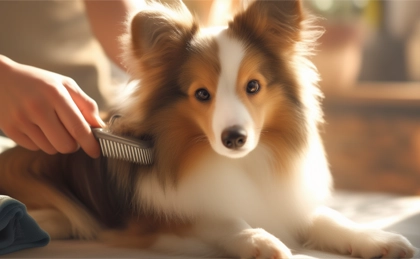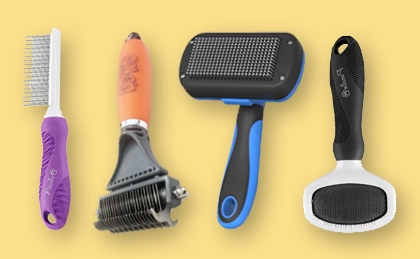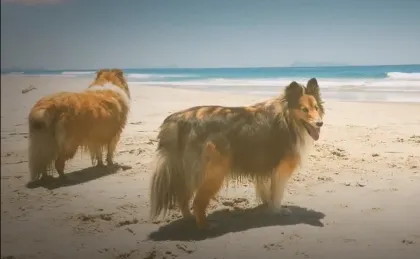How do Shelties react to newborn babies at home? Here's my experience with Howard and Piper with tips on juggling all the critters.
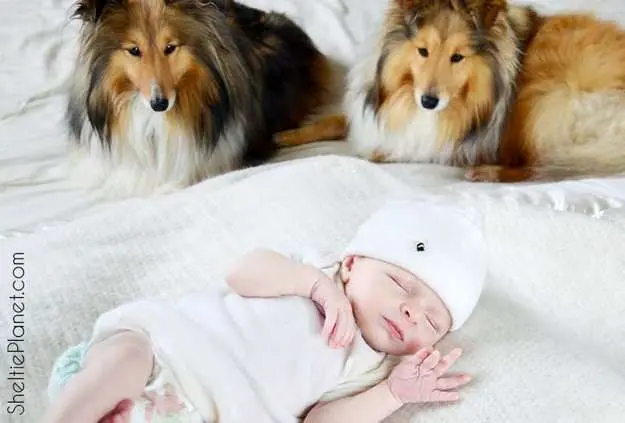
Our Shelties wondering if baby Fox is edible.
It's natural to be apprehensive when you bring your newborn baby home. Your whole life will be different, especially if this is your first child. And having pets around can shake things up that extra bit.
Sadly, some people actually give up their pet dogs because they're worried they'll be jealous of the new baby. If the dog is poorly trained and unpredictable, there's a real fear they could snap at or bite the baby.
It doesn't have to be this way. Sort out any health or behavioral issues in your Sheltie before your baby is born, and you'll be able to keep your fur babies and your regular babies all together for life.
My Story
First we had two fur babies, Howard and Piper. Then we had two human babies, Fox and Kea.
When I brought my first newborn baby home, I was super anxious about everything. The maternal hormones triggered a million imagined threats. I was terrified, for instance, that the Shelties would pull over the bassinette while Fox was sleeping in it. Such a calamity, I thought, would surely lead to head injury and certain death.
Welcome to the mind of a new mother. It's not all milk and snuggles. A lot of the time, we're thinking of all the ways our little one might die. Maybe some mothers push past that pretty quickly. But for me, it was a particularly painful ordeal.
I only recently discovered that all maternal brains are wired for obsessive compulsive behavior in the first few months after having a baby. In evolutionary terms, this hypervigilance is a survival adaptation. I wish I'd known that when I had Fox, because I truly thought I was going crazy.
So it helps to know there's the world inside your head where life can seem pretty catastrophic. And there's the world outside your head where, actually, everything's going to be okay. So how did the Shelties react to the baby in the real world? In a nutshell: they were hopelessly adorable.
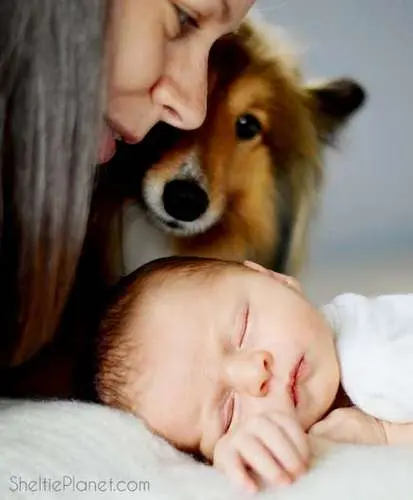
Peek a Boo! Piper wanted in on our newborn photo shoot.
Shelties know that human babies are vulnerable. They see the way you treat your baby and they can see he's pretty helpless and not a physical threat. When you have a nervous Sheltie, like Piper, the real challenge comes down the line when your baby learns to walk up to them and tug on their fur. Then you have to set some firm boundaries.
But when Fox was a baby, our Shelties never harmed him, ever. Not on purpose, and not by accident. All my fears were completely unfounded. Of course, I took some preventative measures to ensure a smooth introduction, and to tell myself I was doing all I could to keep Fox safe.
Install a pet gate on baby's room
Like I say, I was terrified of our sweet Shelties inadvertently tipping over his bassinette. But the gate turned out to be an annoying obstacle for us too, and we took it down after about two days. I watched the Shelties nose around the room a couple of times and when they showed no interest in jumping up to see the baby, this fear melted away. It's a try-it-and-see scenario. I'm not guaranteeing how your dogs will react, but the only way you'll know is if you give them the chance to prove themselves.
Monitor all interactions between dogs and baby
The only way you're doing to know how your individual Sheltie reacts to a baby is by watching their behavior. Mostly, you'll find they want to sniff the baby's face. The sweet milk odor must smell delicious to a dog. They also want to get to know him, and dogs naturally do this through scent detection. Let them do it! Your baby needs to get used to having pets around and this early exposure will also make him more relaxed around critters. There's also evidence that exposure to dogs in infancy reduces the risk of developing allergies and asthma.
Never leave baby alone on the floor with the dogs
I had visions of them trampling right on his face and scratching him, or worse, sitting on him and suffocating him to death. Go hypervigilance! I've heard stories about cats sleeping on top of babies and suffocating them, so I figured dogs could do the same. It turns out these incidents are extremely rare. However, it's common sense not to leave a young baby alone unless they're in a safe sleeping environment. So I was pretty watchful of this scenario until Fox was older and able to handle himself physically if the Shelties got in his face. You can do this on a dog-by-dog basis. I learned to trust my Shelties with Fox, but I wouldn't leave him alone with a different dog right off that bat; you don't know how they'll react.
Of course, this story wouldn't be complete without a cautionary tale. So here's what happened with Kea.
Kea Got Clawed
I was sitting on the couch holding baby Kea in my arms. She must have been two or three months old and still pretty vulnerable as humans go. But I was also a lot more relaxed this time round as tends to happen with subsequent babies.
Fox, now six years old, was prancing around behind the couch, and little did I know that Piper had jumped on the couch behind me for security. Fox had him spooked. And you really don't want a spooked Sheltie around a baby.
Suddenly, Fox shrieked, Piper jumped across my lap, and baby Kea started bawling. That really horrible bawling with the long breath-hold they do when they experience sudden pain. In his panic, Piper had jumped right across her face and scratched her eye with his claws.
I felt like the worst mother in the world for not seeing it coming. She cried and cried and had a horrible mark on her face for days after. I had this rule in my head that babies should never experience a pain that they can't inflict on themselves. So this broke my rule and I felt terrible.
But you know what? She was okay. It was one of those unpredictable moments, a perfect storm of events, that you have to expect might happen once or twice when your baby is little. So if something like this does happen between your Sheltie and your baby, don't despair. Piper never meant to hurt her, and after the racket that ensued, he never did it again.

At six months, this is the closest Piper likes to be with baby Kea.
Shelties + Babies = Difficult?
It's great having dogs around as your kids grows up. You're teaching them a familiarity and love of animals that will stay with them forever. Pets, especially dogs, boost your baby's immune system by exposing them to a wide range of microorganisms. And their interactions bring a lot of joy and laughter.
However, there are two things worth preparing yourself for.
Barking Wakes Up Babies
When Fox was young, our Shelties barked a lot. When your newborn sleeps for a total of 16 hours of the day, that's a lot of unnecessary awakenings. I could put a positive spin on this and say it's great practice for teaching your baby to self-soothe, but who am I kidding? It's a massive pain in the ass.
I strongly recommend you teach your Sheltie to stop barking on command before your baby is born. While it's their instinct to be hypervigilant to changes in the environment, they can be trained to give one or two alarm barks and then stop when you say "Shhh!"
Shelties also bark less as they age because they have less energy to burn. But young Shelties definitely need to get vigorous exercise at the start of the day so they have less pent-up energy to put into barking all day long.
Zoomies is Not For Babies
Shelties love to break into a game of zoomies, especially when they're young and are full of energy. A game of dash around the living room can break out spontaneously, so if your baby's laying on his playmat, lift him quick out of harm's way. Otherwise you can virtually guarantee they'll crash into him, risking a claw-to-the-face scenario.
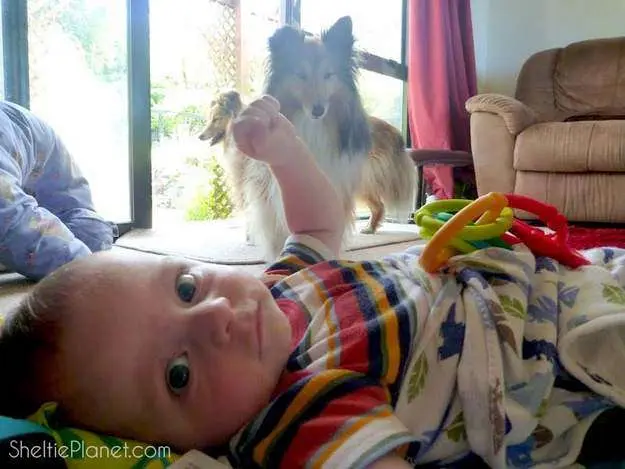
Our Shelties gave baby Fox a wide berth most of the time.
How to Prepare Your Sheltie for Your New Baby
If you're concerned that your Sheltie may be dominant, jealous, or unstable around your newborn, there are some ways to prepare him psychologically. This is especially helpful if your Sheltie has always been the baby of the family and is about to be displaced.
Encourage friends with babies to visit your home
This helps accustom your dog to being around babies in general, as well as babies being in his house. Supervise all dog and baby interactions and watch out for growling as this is a warning sign that your Sheltie may be about to snap at the baby. This primer is excellent preparation for your pooch, and you can tell your friend she is a legend for letting your dog practice on her little one.
Let your Sheltie explore your baby's sleeping area
This introduces your dog to your baby before they actually arrive. Let him sniff all the new clothes and baby gear to get used to the smells. Put baby lotion or powder to your hands and allow your Sheltie a good whiff. Dogs rely heavily on their sense of smell so creating familiarity now will help him recognize your baby as a part of the family when they arrive.
Don't let your dog sleep on the baby's furniture or play with their toys
While you want to encourage familiarity, your Sheltie should understand the boundary between his stuff and the baby's stuff. You don't want him to destroy treasured soft toys or guard things that belong to the baby, creating competition. Instead, get some chewable dog toys that are just for him.
Install a pet gate or baby gate before the birth
This is a personal preference, that either makes you and your Sheltie feel safer around the baby, or just gets in your way. If you want to keep the baby's room out of bounds for your Sheltie, install a gate before the baby arrives. This gives your Sheltie the time to accept the new boundaries when life at home is still calm. Unlike a closed door, the gate allows your dog to see and hear what you're doing in baby's room. He'll feel less isolated from you and be able to relax as he adjusts to the new baby noises.
Get a vet check-up before the baby arrives
Worms and parasites can be harmful to your newborn so be sure to de-worm your dog before the baby arrives (and four times per year thereafter). Hopefully you're doing this already for the sake of your dog's health. If your dog is not already spayed or neutered, this is also the time to get it done. Desexing reduces aggression in males and prevents the complications of heat cycles in females, as well as having a host of long term health benefits. Do it well in advance so the post-surgery recovery happens in your blissfully calm, baby-free house.
Ensure your Sheltie understands his place
While dogs are thoroughly domesticated, they do still retain a sense of social hierarchy, just like humans. Some dogs, including Shelties, can become overly dominant and show undesirable behaviors like resource-guarding and even people-guarding. If your dog thinks he owns you, then he's at a high risk of growling, snapping, and biting at your kids when they try to get between you. That's never okay, and you must correct your Sheltie any time he behaves his way.


The Big Day: Introducing Sheltie to Baby
The first meeting is most important and can influence how your dog responds to your baby hereafter. So I want to run through some tips to get it spot on.
Have someone else hold your newborn while you greet your Sheltie
You've been away for a few days and your best friend has missed you. He'll sense something has changed about you; even your smell is different. Pay lots of attention to your Sheltie when you first get home and reassure him you're delighted to see him again.
Bring your Sheltie a new toy or treat
This creates a positive association with the presence of the new baby. Wait until after your dog's excitement about your homecoming has dissipated, then give him his awesome present.
Leash your Sheltie if you're concerned
You know your dog. Sometimes a leash can reassure him that you're in charge. Other times it can be a frustrating limitation. Decide which is best for your dog in this situation then go for it. Sit on the couch while holding your baby and let him have a good sniff. Tell him he's a good boy. Try not to behave nervous and skittish yourself as your Sheltie will feed off your mood. Be as relaxed and calm as possible, even if it feels weird in your hypervigilant state. Remember that this is the start of an amazing relationship between the critters you love the most.
Don't force any interaction
Allow your Sheltie to meet your new baby at his own pace. If he's reluctant at first, that's totally fine. He's just not sure what this noisy, wriggly little thing can do. Curiosity will drive him to toward your baby eventually. If you do notice any signs of your dog reacting aggressively, like snarling or growling, he probably sees the baby as a threat. This is where you need to be firm. Put him in another room until he's over it and try the introduction again after a short while. Do not let him act hostile toward your baby for any length of time.
Increase your Sheltie's exposure to your baby's personal space
When the interaction is going well, allow your Sheltie to sit and lay next to your baby in a monitored setting. Use treats and praise to reward your Sheltie copiously for good behavior such as gentle sniffing and tail wagging. This will condition your Sheltie to view your baby in a positive light.
As Baby Gets Older
Take extra care as your baby reaches milestones like crawling and walking. For your Sheltie, this may be a scary time: now your baby can enter their personal space and grab at their face and fur.
As I write, Kea is almost two years old, and loves to stick her finger in my eye ("AYE!") and mouth ("MAUF!") For some reason, Howard also puts up with this treatment. Piper runs away. This is okay as long as your dog doesn't react with aggression (if so, you need to correct it right away, even if the baby started it!)
You can help your baby learn by correcting (and re-correcting, and re-correcting) her behaviors too. Rather than just saying "NO" to your baby, teach her the right way to interact with your Sheltie. Demonstrate how to stroke him and say "gentle" as you do. Move her hand in the same way. When they're young, teaching a baby is not that different from training a dog. Positive praise and repetitive modeling go a long way.
Final Thoughts
In time, your little one will understand the rules about handling your Sheltie and likewise, your Sheltie will become secure enough to respect your child as a member of the family. And even though your baby may be your priority now, make sure you spend one-on-one time with your Sheltie every day. It will help you to relax. And as a new mom you definitely need a bit of that.
